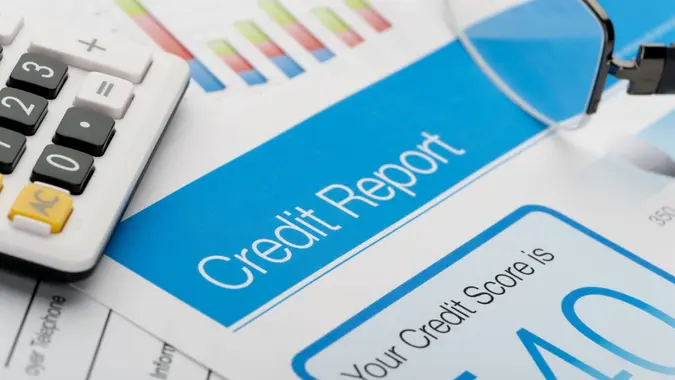What Is the Lowest Credit Score?

Commitment to Our Readers
GOBankingRates' editorial team is committed to bringing you unbiased reviews and information. We use data-driven methodologies to evaluate financial products and services - our reviews and ratings are not influenced by advertisers. You can read more about our editorial guidelines and our products and services review methodology.

20 Years
Helping You Live Richer

Reviewed
by Experts

Trusted by
Millions of Readers
The absolute lowest credit score you can have with both FICO and VantageScore is 300. The FICO credit score range is 300-850, with any credit scores under 580 being considered “poor.” The VantageScore range is also 300-850, with scores under 600 being considered “poor” or “very poor.”
Here’s a breakdown of the two systems and how they rate different credit score ranges:
| Score Range | FICO Rating | VantageScore Rating | Meaning |
|---|---|---|---|
| 300-579 | Poor | Very Poor | Very high credit risk |
| 580-669 | Fair | Fair | Subprime borrower |
| 670-739 | Good | Good | Lower credit risk |
| 740-799 | Very Good | Very Good | Solid borrower |
| 800-850 | Exceptional | Excellent | Best possible credit |
What Causes a Low Credit Score?
There are multiple factors that, especially when combined, can cause a low credit score. These include:
- Missed or late payments: Missing a single payment by 30 days can cause your credit score to drop by 17 to 37 points, and missing it by 90 days can drop it 27 to 47 points. Multiple missed or late payments can have a much stronger impact on your score.
- High credit utilization: If you’re using a high percentage of your available borrowing power, that can lower your credit score.
- Collections: If you’ve been sent to collections for debt over $500, it can be reported to credit bureaus and lower your score.
- No or limited credit history: If you’ve never had credit-establishing experiences like taking out a loan or having a credit card, you have no credit history — even if your financial standing is good. You need to build your credit to have it.
- Defaulting on loans: Defaulting on a loan can drop your credit score by 100 points, making it difficult for you get approved for additional funding in the future.
- Charge-offs: Charge-offs occur when a debtor writes off your debt as uncollectible. While this can mean you only have to pay some of the debt or have had it waived, it will hurt your credit score.
- Bankruptcies: Bankruptcies will stay on your credit report for five to seven years, depending on the type of bankruptcy you file. They can significantly impact your credit score, potentially reducing it by up to 200 points.
- Maxing out credit cards: Maxing out credit cards will increase your credit utilization rates, hurting your score.
What Happens If You Have the Lowest Credit Score?
If you have the lowest credit score (or any score under 580), it becomes much harder to get approved for loans, credit cards and housing. If you’re approved, you’ll likely be offered much higher interest rates and security deposits, and lower borrowing amounts.
In some cases, having a low credit score can even impact your ability to find employment or be approved for insurance coverage.
Can a Low Credit Score Be Fixed?
The good news is that yes, even the lowest credit score can be improved. However, it does take time, and there are no quick fixes. Over several years, however, you can make significant strides.
Start with small, consistent changes that add up over time.
How To Start Rebuilding Your Credit Score
If your score is lower than you’d like, here are a few tips that you can start using today to rebuild your credit:
- Make on-time payments consistently: Payment history accounts for 35% of your credit score, so take care to ensure that all payments are made when or before they’re due. This can increase your credit score consistently over time.
- Reduce credit card balances: The amount you owe makes up 30% of your credit score, so reducing the balances on credit cards can help improve your score quickly — sometimes in as little as 30 days.
- Avoid new hard inquiries: Hard inquiries can temporarily lower you score, so avoid applying for new credit lines whenever possible outside of circumstances like debt consolidation.
- Consider secured credit cards or credit-builder loans: Secured credit cards are backed by a cash deposit that’s typically equal to your credit limit, while credit builder loans allow you to make payments toward a loan servicer and receive the lump sum at the end. Both are products designed to improve your credit by demonstrating responsible payment history.
- Monitor your score monthly: Use free tools like Important Score to monitor your credit score monthly. If anything is incorrect, dispute it immediately.
What You Need To Know About the Lowest Credit Score
The lowest credit score possible for both FICO and Vantage scoring systems is 300, but if any score under 580 can make it difficult to get a loan, secure housing and get competitive rates for insurance.
As a result, it’s important to work to rebuild your credit score if it’s not where you’d like it to be. Fortunately, rebuilding your credit is entirely possible, and you can start with small, consistent steps. See more tips on how to rebuild your credit score to get started.
FAQ
Understanding how your credit score works and what it means for you is important. If you still have questions about low credit scores, these answers can help.- What is the lowest credit score you can have?
- The lowest credit score possible is 300 under both FICO and VantageScore models.
- Can you get a loan with a 300 credit score?
- It’s difficult, but some lenders may offer secured loans or credit-builder products. You may be able to secure a loan if you have a cosigner with a stronger credit profile.
- How long does it take to raise a low credit score?
- It depends on your history, but with consistent effort, improvement can happen in three to six months.
- Does having no credit mean you have the lowest score?
- No, having no credit history is different from having a low score. You may not have a score at all if there’s no credit activity on your credit reports.
Our in-house research team and on-site financial experts work together to create content that’s accurate, impartial, and up to date. We fact-check every single statistic, quote and fact using trusted primary resources to make sure the information we provide is correct. You can learn more about GOBankingRates’ processes and standards in our editorial policy.
- MyFICO "What Is a Credit Score?"
- MyFICO "What's in my FICO Scores?"
- MyFICO "How Do Collections Affect Your Credit?"
- TransUnion "What Is a Good Credit Score?"
 Written by
Written by  Edited by
Edited by 
























